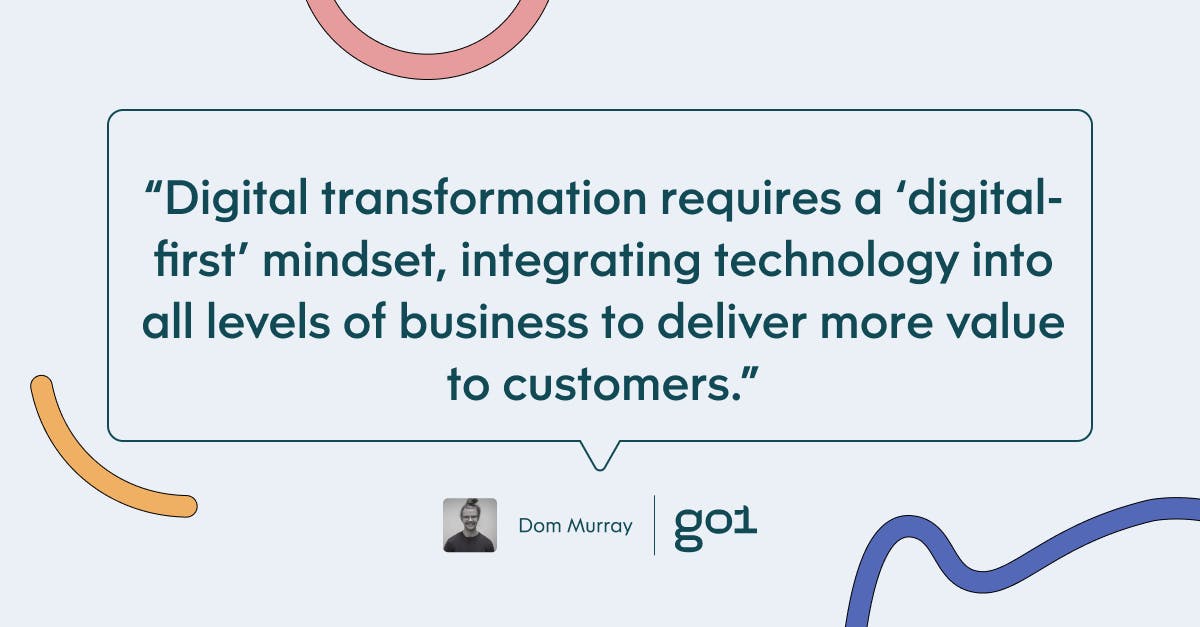
What is digital transformation?

Over the past decade, digital transformation has been a popular topic in business circles. So popular, in fact, that last year, global spending on digital transformation grew by 10.4%, reaching $1.3 trillion. That’s right, trillion. With a T. In other words, digital transformation is a massive global enterprise that will influence the future growth and prosperity of businesses worldwide, regardless of size, industry, or country.
This enormous level of investment begs the question, what is digital transformation? If you don’t already know, now is the perfect time to familiarise yourself with digital transformation, as it is likely to increase exponentially in both scope and relevance in the coming years.
Already, 70% of businesses have a digital transformation strategy or are actively developing one, while companies are expected to invest a further $6.8 trillion in digital transformation initiatives between 2020 and 2023.
To ensure your team can keep up, we’ll take you step-by-step through digital transformation. We’ll start by asking ‘what is digital transformation?’ before analysing the key benefits of digital transformation.
What is digital transformation?
Digital transformation means using digital technologies to create new business models and processes to keep up with evolving customer expectations. In fact, 60% of companies with digital transformation initiatives have already created new business models. As such, integrating new technologies is inherent to digital transformation.
Digital transformation also requires a company-wide culture shift to move on from old, outdated practices to new processes that make the best use of modern technologies. In many ways, it’s a simple case of modernisation. Out with the old, in with the new. Put simply, digital transformation requires a ‘digital-first’ mindset, integrating technology into all levels of business to deliver more value to customers.

According to CIO, digital transformation “marks a rethinking of how an organisation uses technology, people, and processes in pursuit of new business models and new revenue streams, driven by changes in customer expectations around products and services.”
The Enterprisers Project expands on this definition, adding, “Digital transformation is the integration of digital technology into all areas of a business, fundamentally changing how you operate and deliver value to customers. It's also a cultural change that requires organisations to continually challenge the status quo, experiment, and get comfortable with failure.”
To provide a concrete example of digital transformation in action, McDonald’s realised that digital transformation could improve their customer experience. To achieve this, the organisation implemented strategies such as mobile ordering apps to reduce wait times, in-store digital ordering kiosks, and even smart-car drive-thru integrations. As The Power MBA explains, “In McDonald’s case, digital technology such as interactive ordering units, AI drive-thrus, and smart mobile app experiences have helped them reduce that customer experience gap.”
This is just one of many examples illustrating successful digital transformation. Other prominent examples include Netflix transforming from a mail-order DVD service to a streaming giant, and Walmart adopting a cloud platform in 2019 that connects the company’s checkout system to nearly 23,000 point-of-sale devices, allowing for advanced insights into store operations and the customer experience.
The benefits of digital transformation
Now that we've answered the question 'what is digital transformation', it's time to examine the benefits of digital transformation. As mentioned, digital transformation is already a $1.3 trillion industry, meaning the benefits of digital transformation are far-reaching and multi-faceted.
One of the key benefits of digital transformation is gaining a competitive advantage. According to McKinsey, 70% of executives implement digital transformation to secure a competitive advantage or keep up with competitors. As a result, 38% of executives plan to invest even more in digital technology to gain a competitive advantage.
These findings should come as little surprise, given 89% of enterprises are planning to adopt or have already adopted a digital business strategy. Thus, digital transformation is now non-negotiable for many organisations. Without a forward-thinking digital transformation strategy, businesses risk being left behind. 27% of companies say digital transformation is a matter of survival, while 59% of companies who have not yet adopted a digital transformation strategy fear it might already be too late.
It’s easy to see why companies with robust digital transformation strategies gain a competitive advantage, with one study finding that digital-first companies are 64% more likely to achieve their business goals than their peers. What’s more, a survey of the benefits of digital transformation found that more than one-third of businesses say meeting changing customer expectations is the main benefit of digital transformation. Other popular responses included improving operational efficiency (40%), improving new product quality (26%), and introducing new revenue streams (21%).

Additionally, Deloitte found that implementing digital technologies can accelerate progress towards enterprise goals such as financial returns, workforce diversity, and environmental targets by 22%. Likewise, McKinsey finds that data-driven companies are 23x more likely to acquire new customers.
If you’re not already convinced that digital transformation is vital, it also plays a significant role in boosting revenue. According to Forbes, 56% of CEOs say digital improvements have increased their revenue, while digitally mature companies are also 23% more profitable. A similar study by Deloitte found that companies with high digital maturity report 45% revenue growth on average, compared to just 15% for lower-maturity companies.
Accordingly, digital transformation is no longer an optional extra — it is now essential. By adopting digital-first strategies, organisations gain an array of benefits, including increased customer satisfaction, improved operational efficiency, and even a competitive advantage over less digitally mature organisations. In other words, the question is no longer ‘what is digital transformation?’ but rather, ‘how quickly can my team adjust to digital transformation?’
Need support on your digital transformation journey? Go1 can help. Start your free trial today to access dedicated courses on Digital transformation basics, Enabling digital transformation, and many more.
For more insights, be sure to subscribe to the Go1 newsletter to stay on top of all the latest L&D trends. Or, you can book a demo today.




